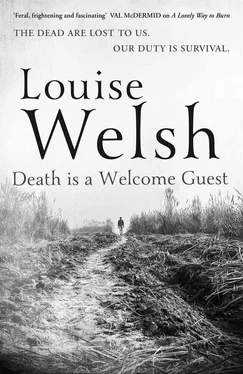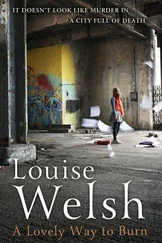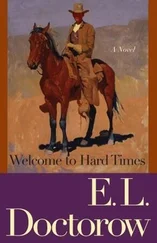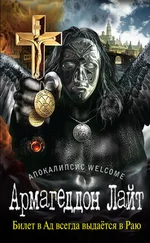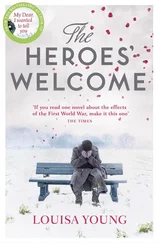‘When I got out of the quarantine centre everything had changed. The city was under martial law. There were curfews at night, looting in the shopping districts, even the occasional dead body in the street.’ He shook his head, as if he still could not believe the events he had witnessed. ‘I don’t know if it was a second wave of the disease or if the sweats just hit some people harder, but the deaths became sudden. I saw a young woman, a girl of about Jaime’s age, drop down dead. One minute she was walking along, short skirt, cute red shoes, the next she was sprawled on the sidewalk. I went to help, but she was beyond help. A man shouted at me to leave her alone if I didn’t want to catch it and so, God help me, I walked away and left her there, face down on the ground, her underwear on display, no dignity, no one to say a few words over her.’
‘What else could you do?’ Magnus thought about the bodies he had left lying on the Underground platform, the girl with long russet hair slumped on the pavement.
‘I could have looked in her purse, checked to see if there was someone I could call. I know my girls are dead, perhaps her father is still waiting somewhere for her.’
Jeb held a hand over the bank of tea lights, watching the way the flames reflected against his skin. He looked up and met the old man’s eyes. ‘No one can bury them all. That’s one of the reasons we’re heading out of London. Other diseases will start to take hold. Cholera, typhoid…’ He shrugged, acknowledging that he had come to the end of his understanding of infections. ‘Other things.’
Magnus thought about the fires Jeb had seen from the top of the hotel; soon it would be too late. ‘We were shot at by soldiers. They told us we were in a controlled zone.’
Eddie nodded. ‘The authorities couldn’t keep up with the number of deaths, but they sure were quick to stamp down on damage to property. Certain zones, shopping districts in the centre of towns, were meant to be no-go. I guess you’ve seen for yourself that it didn’t work.’
Jeb said, ‘It looked like people decided they wanted to die in front of a big flat screen, drinking a bottle of Chivas and wearing nice new trainers.’
Eddie nodded. ‘I always thought of Brits as restrained, but the scenes I saw on television of your city centres reminded me of footage of the LA riots. I didn’t want any part of it, so I maxed out my credit cards, booked myself in here and phoned home every quarter-hour in the hope that someone would pick up. Eventually Ben, my neighbour, answered.’ Eddie’s voice broke. ‘He told me what had happened to my girls.’ The old man covered his face with his hands and took a deep juddering sigh. When he removed them he was calm again. ‘I never bothered to ask Ben what he was doing in my house. Anything there that he wanted, he was welcome to. I just wished him luck and hung up the phone. I’ve been here ever since, screwing up the courage to do what needs to be done.’
Jeb nodded. His face was blank, as if he were back in the prison cell he refused to share.
‘We’re heading north,’ Magnus said. ‘Far north in my case. I’m from Orkney.’ It seemed crass to mention family after Eddie’s tale, but he asked, ‘I don’t suppose you heard anything about how things are up there, in the islands?’
‘No, son.’ Eddie raised his glass to his lips. Magnus got the impression that this time it was an attempt to avoid meeting his eyes rather than an urge for alcohol that prompted the move. ‘I never heard anything about how things are up there.’
‘Why don’t you join us?’ Magnus looked at Jeb, inviting his support, but Jeb stared unspeaking at the candles in front of him.
‘I appreciate the invitation.’ Eddie gave a polite smile and once more Magnus caught a glimpse of the person he had been before the crisis: a man with enough self-regard to stand by his convictions and enough empathy to do so graciously. ‘But I don’t have the energy left for that kind of trip. I thought I might hang around here, see if I can’t find a way into the British Library and take a last look around for old times’ sake. This disaster may have its compensations. I may never see another of Shakespeare’s plays performed, but perhaps I can revisit his First Folio before I die.’
‘There are fires in the city, diseases.’ Magnus looked at Jeb again, but Jeb’s face had regained its shuttered look.
‘This isn’t a time to be sentimental about strangers, not if you want to survive.’ Eddie nodded towards Jeb. ‘He knows that.’ His eyes met Magnus’s. ‘You’re a young man. You still have things you need to do, find a girl, start a family. I did all that. It was fun and I highly recommend it, but there’s nothing left for me. I’ve lost my taste for life.’
His cousin Hugh had been a younger man than Magnus was now, but he had lost his taste for life too. Magnus wanted to say something about the misery of suicide, but the words were beyond his grasp. Somewhere another door slammed. All three of them turned towards the noise, but there was nothing in the lobby except a clash of colours and patterns it had once been thought worth a lot of money to sit among.
Eddie got up and walked slowly towards the bar as if his joints were hurting, though it might have been the shaker full of martini inside him that slowed his pace. ‘There are more survivors than you might think.’ It should have been a cause for celebration, but Eddie’s expression was serious. ‘Keep your eyes open, and be careful how you go. Like the bard said, “The world is grown so bad, that wrens make prey where eagles dare not perch.”’
By then we had made our covenant with silence,
But in the first few days it was so still
We listened to our breathing and were afraid.
‘The Horses’, Edwin Muir
The sound of Magnus and Jeb’s motorbikes cut through the countryside, announcing their progress. Despite the heat they were both dressed in motorcycle leathers and crash helmets, both of them with scarves wrapped around their mouths and noses to guard against the dust and the stench of decay. The smell had grown worse as they left London behind. The summer had been a good one and crops had ripened earlier than usual. Now they lay rotting in the fields. Cattle also lay in the fields and some of them were rotting too.
The motorbikes had been Magnus’s idea, the guns strapped to their backs Jeb’s. They had planned to spend their nights sheltered in houses large enough to have spare bedrooms left unoccupied by the dead, but had encountered too many decaying corpses, too many families huddled together in death, too many blown-out brains and emptied pill bottles. Now they camped outside, taking turns to stay awake, like cowboys crossing the plains in some old movie.
Magnus reckoned that he could have reached the ferry terminal at Scrabster in two days, if he had bombed the journey. But they had met the aftermath of several accidents on their way out of London: a driver thrown through the windscreen of his car, a teenage boy impaled on the railings of a park he had somehow got locked inside, a little girl who had fallen from a high, neglected building; that last one had made Magnus cry. The tears had been a release, and he had hated himself for feeling better.
The accidents were a reminder that it was not only the sweats they needed to survive and they had agreed to stick to a steady thirty miles an hour, in the hope of avoiding a broken leg, or worse.
Magnus and Hugh had graduated to motorbikes in their teens. They had weathered the usual falls and near misses, raced each other past Maes Howe, the sky stretching wide and seamless above them. Neighbours had warned their parents of the speeds the boys went, but even his father’s sudden death had not persuaded Magnus of his own mortality.
Читать дальше
